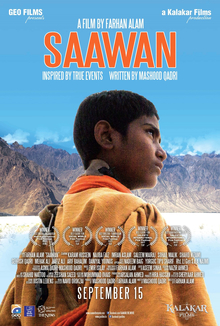Related Research Articles

Zinda Bhaag is a 2013 Pakistani Punjabi-language drama film co-directed by Meenu Gaur and Farjad Nabi, and produced by Mazhar Zaidi. The film focuses on the issue of illegal migration. The film had a premiere show on 19 September 2013 and a wide release on 20 September. The film was selected as the Pakistani entry for the Best Foreign Language Film at the 86th Academy Awards, the first in over 50 years. The film was made as part of a project on masculinity titled Let's Talk Men, affiliated with United Nations agencies for the prevention of gender-based violence.

Meenu Gaur is a London-based British-Indian director and screenwriter. She is best known for her 2013 Pakistani film Zinda Bhaag which she co-wrote and co-directed with Farjab Nabi. The film was an entry to the foreign film category at the Oscars. She is presently working on a feature film titled 'Barzakh:Between Heaven and Hell' supported by the Locarno International Film Festival's Open Doors Hub Programme. She has also been part of Berlinale Talents and the NIPKOW film residency in Berlin, supported by Berlinale and Medienboard. Recently, SOAS, University of London installed her portrait on the school walls as part of the Alumni Series that celebrates notable alumni.

The 1st ARY Film Awards or AFA'14 ceremony, presented by ARY Digital Network and Entertainment Channel, sponsored by Nokia, powered by ZONG and L'Oréal and took place on 27 April 2014 at the Golf Club, DHA Phase VIII, Karachi. The ceremony was held recorded and televised on 24 May 2014. During the ceremony ARY Digital Network and Entertainment Channel presented ARY Film Awards in 29 categories and 4 special awards honoring the actors, technical achievements and films of 2013. The ceremony, televised in Pakistan by ARY Digital and was produced by ARY Digital Network chairman Salman Iqbal. ARY Film Awards became the most expensive event held in Pakistan.

Dukhtar is a 2014 Pakistani drama-thriller film directed by Afia Nathaniel. The film stars Samiya Mumtaz, Mohib Mirza, Saleha Aref, Asif Khan, Ajab Gul and Samina Ahmad. The film is Afia Nathaniel's feature directorial debut; she also wrote and produced the film. It is the story of a mother and her ten-year-old daughter, who leave their home to save the girl from an arranged marriage to a tribal leader.
Mazhar Zaidi is a British Pakistani film producer, artist, journalist, columnist and documentary director. He has produced several issue based documentaries and campaigns. He has developed, managed and delivered large international projects on CVE and produced digital campaigns on rights based issues for leading international non-governmental organisations including UKAid, IRC, CWS, creative Associates and Asia Foundation. He is best known for producing the 2013 Pakistani film Zinda Bhaag, which earned him international recognition and accolades and became the country's first entry to Academy Awards after a gap of over 50 years. The film also won many international awards. One of his films Gardaab which was set in extremist violence prone neighbourhoods of Karachi, screened at London Indian Film Festival in June 2017 and Jeewan Hathi was screened at Locarno Film Festival in Switzerland in August 2017. He along with his partners Meenu Gaur and Farjad Nabi also recently curated an art exhibition titled Art SabKa focussing on contemporary art inspired by Pakistani Cinema.
Farjad Nabi is a Pakistani writer, film producer, director, cinematographer and documentary maker. His 2013 feature film Zinda Bhaag, co written and co directed with Meenu Gaur, became the first Pakistani film in over fifty years to be submitted for Oscar consideration in the 'Foreign Language Film Award’ category at the 86th Academy Awards He rose to prominence in 1997, when his debut film Nusrat has left the building...But When? won the Second Best Film Award at Film South Asia, Kathmandu. In 1999 his second film No One Believes the Professor entered the Film South Asia festival and won the Best Film Award.
The Pakistani Academy Selection Committee (PASC) is a non-governmental selection committee of Pakistani film director, producers, writers, actors, distributors and exhibitors, headquartered in Karachi and Lahore. The PASC selects the Pakistani Official entry for the Academy Award for Best Foreign Language Film each year. However, submission is not bound to Foreign Language category, if meets with the eligibility requirements of Academy's rules, it is permissible for every competitive award. Sharmeen Obaid-Chinoy is a chairman and head of committee who overseen the final selection for Oscars and is a lifetime member of PASC. In 2013, committee shortlisted the four films.

Saawan is a 2017 Pakistani drama film directed by Farhan Alam and produced and written by Mashood Qadri under the production banner of Kalakar Entertainments. The film is based on a true story of a disabled child, who faced difficulties in the deserts of Pakistan. The film stars Saleem Mairaj, Syed Karam Abbas, Arif Bahalim, Najiba Faiz and Imran Aslam in the lead roles. The other cast includes Tipu Sharif, Hafeez Ali, Sehrish Qadri, Sohail Malik, Shahid Niazmi, Muhammad Abbas, Danial Yunus, Mehek Zulfiqar and Syed Muhammad Ali. A special appearance is made by Lt. Gen. S. A. A. Najmi (R). It was selected as the Pakistani entry for the Best Foreign Language Film at the 90th Academy Awards, but it was not nominated.
References
- General
- "List of Pakistani Submissions for the Academy Award for Best Foreign Language Film". Pakistani Academy Selection Committee and Sharmeen Obaid-Chinoy Films . Retrieved 20 December 2014.
- Specific
- ↑ "Academy announces rules for 92nd Oscars". Academy of Motion Picture Arts and Sciences. 23 April 2019. Retrieved 12 July 2019.
- ↑ "Academy Announces Rule Changes For 92nd Oscars". Forbes. Retrieved 12 July 2019.
- ↑ "History of the Academy Awards – Page 2". Academy of Motion Picture Arts and Sciences. Archived from the original on 6 April 2008. Retrieved 7 April 2013.
- ↑ "Rule Thirteen: Special Rules for the Foreign Language Film Award". Academy of Motion Picture Arts and Sciences. Academy of Motion Picture Arts and Sciences. Archived from the original on 22 August 2013. Retrieved 26 August 2013.
- ↑ "History of the Academy Awards – Page 1". Academy of Motion Picture Arts and Sciences. Archived from the original on 13 April 2008. Retrieved 26 July 2012.
- 1 2 "Deteriorating Cinema of Pakistan". Diplomatic circle. 19 December 2014. Retrieved 20 December 2014.
- ↑ Jones, Owen Bennett (2002). Pakistan : eye of the storm . New Haven and London: Yale University Press. pp. 16–7. ISBN 9780300097603.
... Zia rewarded the only political party to offer him consistent support, Jamaat-e-Islami. Tens of thousands of Jamaat activists and sympathisers were given jobs in the judiciary, the civil service and other state institutions. These appointments meant Zia's Islamic agenda lived on long after he died.
- ↑ "Sharmeen selected by PASC to its chairman, to seek the oscars after fifty years". NewsWeekPakistan. 19 December 2014. Retrieved 20 December 2014.
- ↑ "Call For Oscar Submission For Pakistani Filmmakers by PASC". Media Poondi. 3 August 2013. Archived from the original on 14 December 2014. Retrieved 11 December 2014.
- 1 2 "Pakistan sends official entry to Oscars after 50 years". Arab News. 5 August 2013. Retrieved 26 August 2013.
- 1 2 "First Pakistani Picture, made its way to oscar". Dawn News. 17 February 2002. Retrieved 20 December 2014.
- 1 2 "Second film of Pakistan, on the way to Oscars". Film.com. Retrieved 20 December 2014.
- ↑ "The Pakistani Academy Selection committee nominates Zinda Bhaag for Oscar consideration". Apnahub. Archived from the original on 21 September 2013. Retrieved 13 September 2013.
- ↑ "Dukhtar selected for Oscar consideration by Pakistan Committee". dawn.com. 18 September 2014. Retrieved 18 September 2014.
- ↑ "Oscars: Pakistan Enters 'Moor' in Foreign-Language Film Race". The Hollywood Reporter . 10 September 2015. Retrieved 10 September 2015.
- ↑ "Mah-e-Mir selected as Pakistan's official submission to 2017 Oscars". The Express Tribune . 22 September 2016. Retrieved 22 September 2016.
- ↑ Frater, Patrick (17 September 2017). "Desert Drama 'Saawan' Selected by Pakistan for Oscar Contention". Variety. Retrieved 17 September 2017.
- ↑ "'Cake' submitted as Pakistan's official entry to Oscars 2019". The Express Tribune. 18 September 2018. Retrieved 18 September 2018.
- ↑ "Geo Films 'Laal Kabootar' selected as Pakistan's official entry for the Oscars". The International News. Retrieved 13 September 2019.
- ↑ "'Zindagi Tamasha' is Pakistan's submission to the Oscars". The Express Tribune. 28 November 2020. Retrieved 28 November 2020.
- ↑ "'Joyland' is Pakistan's entry for Oscars 2023". The Express Tribune. 30 September 2022. Retrieved 30 September 2022.
- ↑ Verhoeven, Beatrice (27 October 2023). "China Submits 'The Wandering Earth 2' As Its 2024 International Oscars Entry (Exclusive)". The Hollywood Reporter. Retrieved 28 October 2023.
- ↑ "Zinda Bhaag reflects new generation of Pak filmmakers and viewers: Meenu Gaur and Farjad Nabi". Sirijana Mitra Das. The Times of India. 23 September 2013. Retrieved 20 December 2013.
- ↑ "Catching Up With Afia Nathaniel, Director of Dukhtar". PASTe. Valentina. 6 September 2014. Retrieved 9 September 2014.
- ↑ "Afia Nathaniel on Rugged Journey to Bring Pakistani Child Marriage Drama to Screen". Variety. 6 September 2014. Retrieved 9 September 2014.
- ↑ "Dukhtar: A Woman's Story in Pakistan". The Diplomat. Soniya Rehman. Retrieved 23 August 2014.
- ↑ "From a mother to her dukhtar". The Express Tribune. Rafay Mahmood. Retrieved 11 July 2014.
- ↑ "Dukhtar - a voice against unwilling tradition". Voice of America (Urdu). Retrieved 17 July 2014.
- ↑ "Pakistan Sends 'Mah E Mir' to the Oscars". Variety. Retrieved 22 September 2014.
- ↑ "Pakistan selects Mah-e-Mir as entry for 2017 Oscars". Geo News . Retrieved 22 September 2014.
- ↑ "Saawan selected as Pakistan's submission to Oscars 2018". Dawn Images. 17 September 2017. Retrieved 14 October 2017.